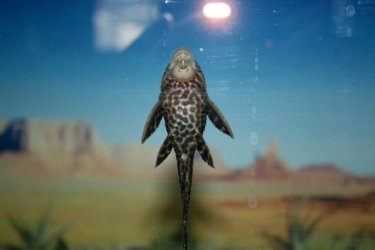You are using an out of date browser. It may not display this or other websites correctly.
You should upgrade or use an alternative browser.
You should upgrade or use an alternative browser.
Is This A Common Pleco?
- Thread starter jackbc48
- Start date
aly_starh
Fish Aficionado
It looks like a sailfin, which is common. Not 100% sure though.
aly_starh
Fish Aficionado
ok, yes im now 80% sure its a common pleco
Davo86
Cichlids, Catfish and Oddballs
How often are you doing water changes and what % do you change?
The more water changes occur the quicker they will grow,
Also get them onto some high protein foods, fed only a few times per week, which will boost growth
The more water changes occur the quicker they will grow,
Also get them onto some high protein foods, fed only a few times per week, which will boost growth
as omnivores, they are not adverse to some meat, either. i feed roast chicken, once a week. but they eat bloodworm pellets, flake. fresh, uncooked, cucumber, courgettes. even peas.(peeled). providing you check salt levels. tinned veg, like, carrots, peas and celery are all fine too.
three-fingers
Fish Connoisseur
Though chicken meat wont really be a good thing, following quote from The Skeptical Aquarist:
Healthy mammal liver tissue and heart muscle don't have fat in them. Mammal and bird fats tend to be unsaturated fats. In the warm-blooded creature they remain soft, but at cool fish temperatures they harden and go waxy. So, though you may feed some beef heart or liver, muscle meat from any bird or mammal is not recommended as fish food. The essential unsaturated fatty acids that must be supplied in the fishes' diet, are not the same series that warm-blooded creatures require. "Wild Discovery" photographers might throw the carcass of a capybara to the piranhas, but the piranhas' more usual prey are other fish.
Fish aren't geared to deal with much fat and lipids anyway. Surplus fats that can't be burned get stored in the fishes' liver. Eventually the liver tends to enlarge, finally badly enough to make the fish look bloated. Liver disfunction results in retained water, a condition we still might be calling "dropsy" or attributing to constipation.
Though chicken meat wont really be a good thing, following quote from The Skeptical Aquarist:
Healthy mammal liver tissue and heart muscle don't have fat in them. Mammal and bird fats tend to be unsaturated fats. In the warm-blooded creature they remain soft, but at cool fish temperatures they harden and go waxy. So, though you may feed some beef heart or liver, muscle meat from any bird or mammal is not recommended as fish food. The essential unsaturated fatty acids that must be supplied in the fishes' diet, are not the same series that warm-blooded creatures require. "Wild Discovery" photographers might throw the carcass of a capybara to the piranhas, but the piranhas' more usual prey are other fish.
Fish aren't geared to deal with much fat and lipids anyway. Surplus fats that can't be burned get stored in the fishes' liver. Eventually the liver tends to enlarge, finally badly enough to make the fish look bloated. Liver disfunction results in retained water, a condition we still might be calling "dropsy" or attributing to constipation.
I'm sure you are right. well no, not really. but hey, it doesn't seem to harm any fish, and im far from the only person to do it. red/fatty meat i would not consider feeding. but chicken breast, is well known to be low in fat. and when roasted, even more so. its also high in protein, so you feed sparingly.
maybe i should have said CHICKEN BREAST, lol. but apart from that, i stand by my comment.
Similar threads
- Replies
- 7
- Views
- 268
- Replies
- 3
- Views
- 167


